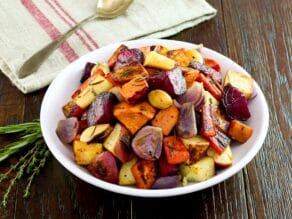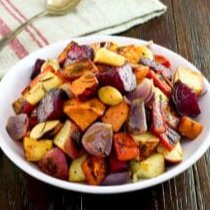
Ingredients:
1 pound yams (or sweet potatoes) – 2 small or one large, peeled
3/4 pound unpeeled red or Yukon gold potatoes, scrubbed clean
1/2 pound beets (red or golden), trimmed and scrubbed clean
1/2 pound large carrots, peeled and halved lengthwise
1 parsnip medium sized (4-5 oz), peeled and halved lengthwise
1/2 red onion, peeled
6 whole garlic cloves large sized
1/4 C extra virgin olive oil, divided
2 T fresh thyme leaves (or 2 tsp dried thyme)
5 sprigs fresh rosemary (or 3 tsp dried rosemary)
1 tsp ground cumin (can be omitted)
1 tsp kosher salt or more to taste
1/4 tsp black pepper or more to taste
Notes: Root vegetables have a sweet, earthy flavor that seems made for roasting. Serve as a side dish or add leftover cooked chicken or garbanzo beans at the last 10 minutes of cooking to heal the protein through. The recipe is easy to double on 2 cookie sheets and roasted at the same time for a crowd, a buffet or to freeze some. See below.
You can use any combination of root vegetables you like. If using red beets your other vegetables may take on a bit of red color. It is pretty, but if you don’t like it, use golden beets instead. The photo above and a short video of Oven Roasted Root Vegetables is from Tori Avey.
Advance Prep:
You can do all of the chopping, peeling, and measuring up to two days ahead. Place ingredients into a sealed refrigerator bag, seal and toss ingredients to coat, then refrigerate until ready to cook. Pop them in the oven when you’re ready to roast.
You can roast the vegetables up to two days ahead. Cook them until almost (but not quite) fully tender. Refrigerate in a sealed bag. Just before your meal, reheat in a 400 degree F oven for just a few minutes. By the time they’re heated through, they’ll be perfectly cooked. OR, put them on a cookie sheet in a single layer, freeze and bag them partially cooked for another meal!
Instructions:
Place a rack in the bottom of your oven and preheat oven to 400 degrees F. Unless indicated otherwise above, slice all vegetables into chunks roughly 1 1/2 inches wide. The more similar the size of the vegetable pieces, the more evenly they will roast.
Place cut vegetables and garlic cloves into a large mixing bowl. Add 3 T olive oil, fresh thyme leaves, ground cumin, kosher salt, and black pepper. Stir until all vegetables are evenly coated with oil, spice and herbs. Brush large rimmed baking sheet with remaining 1 tbsp olive oil. Spread the vegetables out evenly on the baking sheet. Place the rosemary sprigs on top of the vegetables, evenly spaces across the sheet.
Roast the vegetables in the oven for 15 minutes. Stir, bringing the chunks from the outside towards the center and the chunks in the center out towards the edges. Return baking sheet to oven and continue to roast until the largest chunks are tender and the edges are starting to turn golden/dark, another 15-25 minutes.
Remove the roasted rosemary sprigs and stir the vegetables (some leaves of rosemary will remain, this is good). Season with additional salt and pepper to taste, if desired. Vegetables can be served warm or at room temperature.
If you would like to be notified when we share new recipes, be sure to scroll to the bottom, provide your email address, check the box confirming you are not a robot, click on a few photos to prove it and click subscribe! You will then receive an email after each new post. Remember, we're always looking for new recipes, so keep sending them to ecopact@fspa.org!
Story:
Roasted root vegetables are a savory treat this time of year and you can make extra to freeze for a side dish or creamy soup! They exemplify the invitation to eat seasonally in winter. Storing Winter Vegetables Have you ever had potatoes or onions begin to sprout and soon spoil as they waited for you to use them?
The Spruce has some detailed recommendations like using soft or bruised vegetables first, which root vegetables should go in the fridge in a low humidity drawer and keeping onions and spuds in separate pantries or cupboards. Keeping winter veggies out of the light and providing good ventilation in wire baskets, a paper bag or even a cardboard box with holes can help reduce sprouting and spoilage of potatoes, garlic, beets and sweet potatoes. Our grand and great-grandmothers knew!





Post a Comment